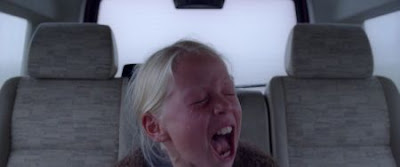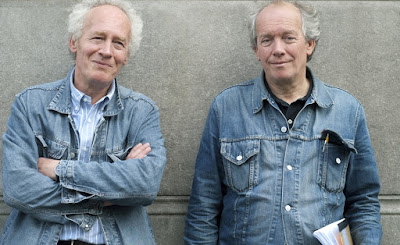If we don't know by this time, via its movies at least, that the Nordic island country of Iceland has a culture and character pretty damned different from all others, even those of Scandinavia, to which it most probably closely compares, then the new film, A WHITE, WHITE DAY, should bring that point home all over again. It's surprisingly quiet (especially for a movie in which a kidnapping and a likely suicide occur) and somewhat repetitive, yet days after viewing it, the film keeps coming back to mind at odd times and in odd ways. It's sneakily memorable.
As written and directed by Hylnur Palmason (shown at right; this is his second full-length feature), the film begins as we follow a car traveling down a lonely, snow-surrounded highway in a lot of fog. After the first "event," we move to a shot of a field with a house under construction in the distance, as horses graze, day changes to night and then one season becomes another.
All this (below) is both repetitive and time-consuming, and yet it holds us via its very obstinacy: We haven't even seen a human face as yet.
Ingimundur and Salka make quite the team; they easily put in the shade the rest of the supporting cast, all of whom are excellent, even as the support circles around these two protagonists, as satellites who job it is to help guide the pair to some kind of fruition.
The plot, which I will not much go into, involves everything from caring and betrayal to crackerbarrel therapy, soccer games, anger and revenge. What makes the movie work so very well, aside from the excellent performances and smart, less-is-more writing and direction, is that particular, maybe even peculiar, Icelandic character.
Perhaps because of its wintry locale and sparse population, citizens seem to be allowed to make mistakes -- some of these real doozies -- without the kind of constant supervision, reprimands, penalties and whatnot that so many countries (western or eastern) seem to inflict. There's a kind of trust implicit here that a person can and will arrive at his own place at his own pace. Call it built-in forgiveness, maybe? Along with the ability of citizens to take some real responsibility for themselves.
Whatever: These cultural "traits," for lack of better word, imbue this work with the kind of substance and oddball grace that many would-be-more-important movies never get near. Another fine and interesting film from Film Movement, A White, White Day will have its "virtual cinema" premiere tomorrow, Friday, April 17, in locations across the country. Click here to view venues and learn more information.























































